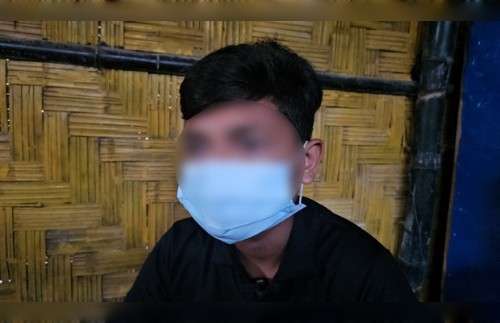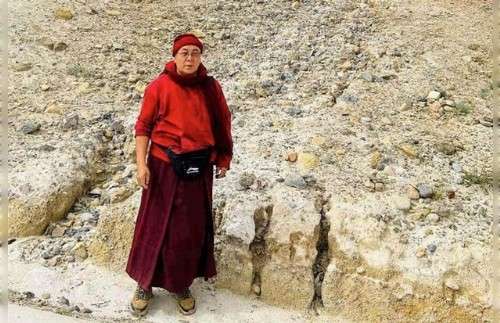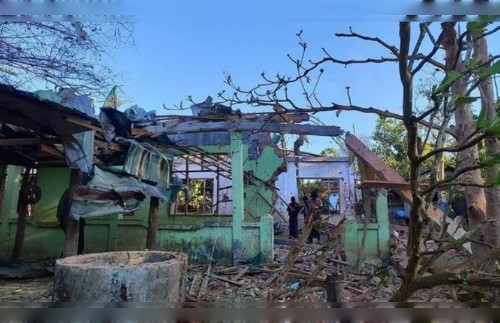
In a screen grab from her video report, Isobel Yeung speaks to the camera as she reports~ Vice News/HBO
Foreign journalists endure monitoring by plainclothes security, Potemkin tours of state-run facilities, a clampdown on the flow of information, and a formidable propaganda machine to report on China’s policies in the Xinjiang Uyghur Autonomous Region (XUAR), according to one member of the media who recently traveled there.

Isobel Yeung, a correspondent for Vice News, visited the XUAR capital of Urumqi and city of Kashgar (in Chinese, Kashi) in January, and returned to the region to visit Hotan (Hetian) city in May, to investigate reports that authorities have detained up to 1.5 million Uyghurs and other Muslim minorities accused of harboring “strong religious views” and “politically incorrect” ideas in a network of internment camps since April 2017.
Yeung and a colleague traveled to the XUAR both times as tourists running “a travel blog” as part of a bid to learn what they could about the camps and accompanying “kindergartens,” where Uyghur children are placed when their parents are detained, as well as to capture footage of the government’s substantial security apparatus and speak with residents about what life is like in the region amid increased restrictions.
The result of their investigation was compiled into a 32-minute video released in late June as an episode of the HBO series Vice News Tonight and posted on YouTube, where it has been more than 1.6 million times.
“We decided to go in as tourists, undercover essentially, because it’s been really difficult for journalists to report on the area, because journalists have been followed wherever they go,” Yeung told RFA in an interview, adding that when reporters are permitted to cover the camps they are presented with a “dog and pony show” to promote the government’s claims that they are “boarding schools” that provide vocational training for Uyghurs, discourage radicalization and help protect the country from terrorism.
“We were hoping to do something a little bit different and we were really hoping to try to get a sense of the Orwellian state that is really playing out at the moment in that region, as well as to get voices from Uyghur people on the ground, and hopefully to uncover some of the realities behind what’s happening to children, among other things.”
While in Urumqi, Yeung’s team documented well-armed police patrols on nearly every block, security checkpoints every few hundred yards outfitted with face and body scanners, and closed circuit cameras in virtually every public area of the city.
The reporters then traveled by train to Kashgar, where they encountered store owners being trained in the street by police officers to use clubs against “radicalized terrorists” and spoke to Han Chinese youths outside a nightclub about increased security measures in the city.
In both situations, they were detained briefly by security personnel who confronted them about filming without permission and felt that they had to leave the region because authorities had been alerted to their presence and were making it difficult for them to speak with anyone.
Investigating ‘kindergartens’

After a visit with Uyghur exiles in Istanbul, Turkey who had fled persecution in the XUAR, Yeung learned that many had left behind children who they believed were being held in facilities akin to orphanages throughout the region that are designed to look like regular schools, but where minders systematically assimilate Uyghur youth into Han Chinese culture.
Armed with the information, Yeung traveled to Hotan to investigate some of the “kindergartens,” but encountered even more stringent security than during her first visit to the region.
We got stopped many, many times, wherever we went, and it was a very logistically difficult and challenging shoot to pull off,” she said.
While the team was unable to enter any of the several locations it had identified as “kindergartens,” they were able to monitor activity at the sites, which Yeung said functioned little like normal schools.
“We saw kids who were there on a Sunday, which is obviously not normal school operating hours,” she said, adding that at one particular site “it didn’t seem like any kids were coming or leaving at normal end-of-school hours.”
“A lot of these buildings were built in run-down neighborhoods, which struck me as a strange place to build such huge kindergartens,” Yeung said.
“The scale at which we suspect this is happening is [substantial] and it’s really an effective way to assimilate the next generation to ensure that they themselves are stripped not only of their families’, but also their own, identities, as well as their culture and their language.”
Propaganda and information clampdown

During her two visits to the XUAR, Yeung also encountered Han Chinese citizens who would regularly espouse the same claims made by the Chinese government’s official media that the region is facing the threat of terrorism from radicalized Muslims, and that restrictions are necessary to ensure public safety and improve the lives of the Uyghur people.
“I think what the Chinese government has latched on to is about fear, and they have really ran with it,” she said.
“It doesn’t … justify putting the sheer number of people inside these so-called ‘re-education camps.’ But they have really amplified that fear and I think it’s very effective, and … a lot of Han Chinese people believe in that kind of propaganda, because the one-party state means that is the main media source that you’re getting.”

In addition to propaganda, authorities have instituted a clampdown on the flow of information in and out of the XUAR as part of a bid to control the narrative about what is happening in the region, and Yeung and her team were repeatedly told to delete video and photos, as well as to refrain from speaking with people on the street without official permission.
“The level to which the Chinese Communist Party has gone to control the information coming out of that region is [significant]—it’s the most sensitive part of the country to report from right now and every journalist that I’ve spoken to who has gone there has found it incredibly difficult to get any accurate information,” she said.
“This is one of the greatest human rights atrocities in the world right now, but I also feel like there aren’t necessarily a lot of people who are in a position to go in there. So many Chinese [citizens] that I’ve spoken to would love to report on this, but they have ties in China and don’t want to put their families at risk.”
Yeung told RFA that while she knew she was at risk of detention, she decided to pursue her reporting to help make people outside of the XUAR understand how Chinese rule is affecting the region’s residents.
“I did feel that I was in a unique position [as a foreigner] to be able to go in there, because I don’t have close family members in the country, and it’s a topic I don’t feel is getting the global attention that it deserves given what’s going on and given the scale of it,” she said.
“You ask most people who the Uyghurs are and, sadly, they don’t know, and they don’t know what’s going on. So as journalists, it’s our responsibility to try to bring an awareness about the situation on the ground there.”
Reported by Mamatjan Juma for RFA’s Uyghur Service. Written in English by Joshua Lipes
Copyright © 1998-2016, RFA. Used with the permission of Radio Free Asia, 2025 M St. NW, Suite 300, Washington DC 20036. https://www.rfa.org
















